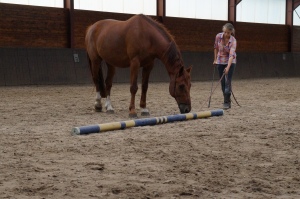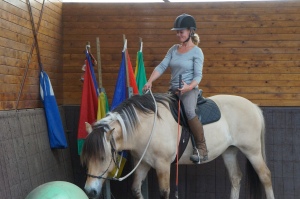In our last article I promised to share some of the most obvious lessons learned during the NH Experience 2015. In this article we’ll talk about lesson no.1 from that list which is about: using your brain…and learning how to help your horse do the same during your training:
- Use psychology
One of the things that is immediately clear whenever Berni Zambail gets involved in a lesson is how creative and strategically he works with both the horse and the human. One of his greatest talents is probably the way he is able to make a game out of everything.
This way you soon realize how we still force our horse (in a very patient and friendly way of course) to do things…instead of helping him, to figure things out on his own and see how much fun it can be to play with us.
 One simple example from a game that was used a lot during the course:
One simple example from a game that was used a lot during the course:
*Goal of the game: send your horse, from zone 3 (behind his shoulder) to touch a cone with his nose.
*Commonly used strategy: You ask your horse forwards, point to the cone and before he passes it you stop him, ask him forwards again and before he makes the mistake of passing it you stop him again. If he looks around for something else you bump him on the nose and block his way until he touches the cone by accident.
*Horsemanship strategy: You point to the cone and ask your horse forwards and wait….until he actually passes the cone. Then you remind him that he was getting colder (away from his target) by backing him up a few steps, and then try again. If he stops close to the cone and lowers his head, or looks at it or something in that line…you smile, rub him and ask him to try again until you see the ‘click’ happen in his face and he touches it.
Beware: this is not a right / wrong game, it’s a warm / cold game… just like you used to play in kindergarten. So if he does something that gets him closer to your target… let him know he’s ‘getting warmer’ and smile or reward him.
Can you see the difference between strategy 1 where you’re babysitting your horse and tell him what he can and cannot do until he sees there is no other option than to touch the cone….or strategy no.2 where you help him to start guessing and when he makes a mistake you allow it so you can teach him something? This way he gets to use his brain and actually learn something about communicating with you, not just a trick.
So how do I know if I’m using (the right) psychology?
These are several possible questions you could ask yourself to check:
- Does my horse really have a choice? Remember the following quote: ‘Make the right choice easy and the wrong choice difficult –> and DON’T ‘Make the right choice easy and the wrong choice impossible.’
- Are you actually rewarding the slightest try? Can you tell when your horse starts to think about the right things and are you showing him that he’s ‘getting warm’?
- Does it still feel like a game to you? Are you still patient and smiling? If not… then the chance is big that you’re going to start to take his free agency away soon. And if you can’t get that smile back on your face and mean it? No problem… just give him a hug and call it a day; come back tomorrow and try again.
 So our challenge for the week: before every training or play session take just a minute to think about how you are going to turn your exercise into a game for the horse so that he doesn’t just learn a new trick but actually gets smarter.
So our challenge for the week: before every training or play session take just a minute to think about how you are going to turn your exercise into a game for the horse so that he doesn’t just learn a new trick but actually gets smarter.
And of course we would love to hear about your creative ideas!
Lees je het artikel liever in het Nederlands? Hieronder vind je het origineel—> Continue reading



